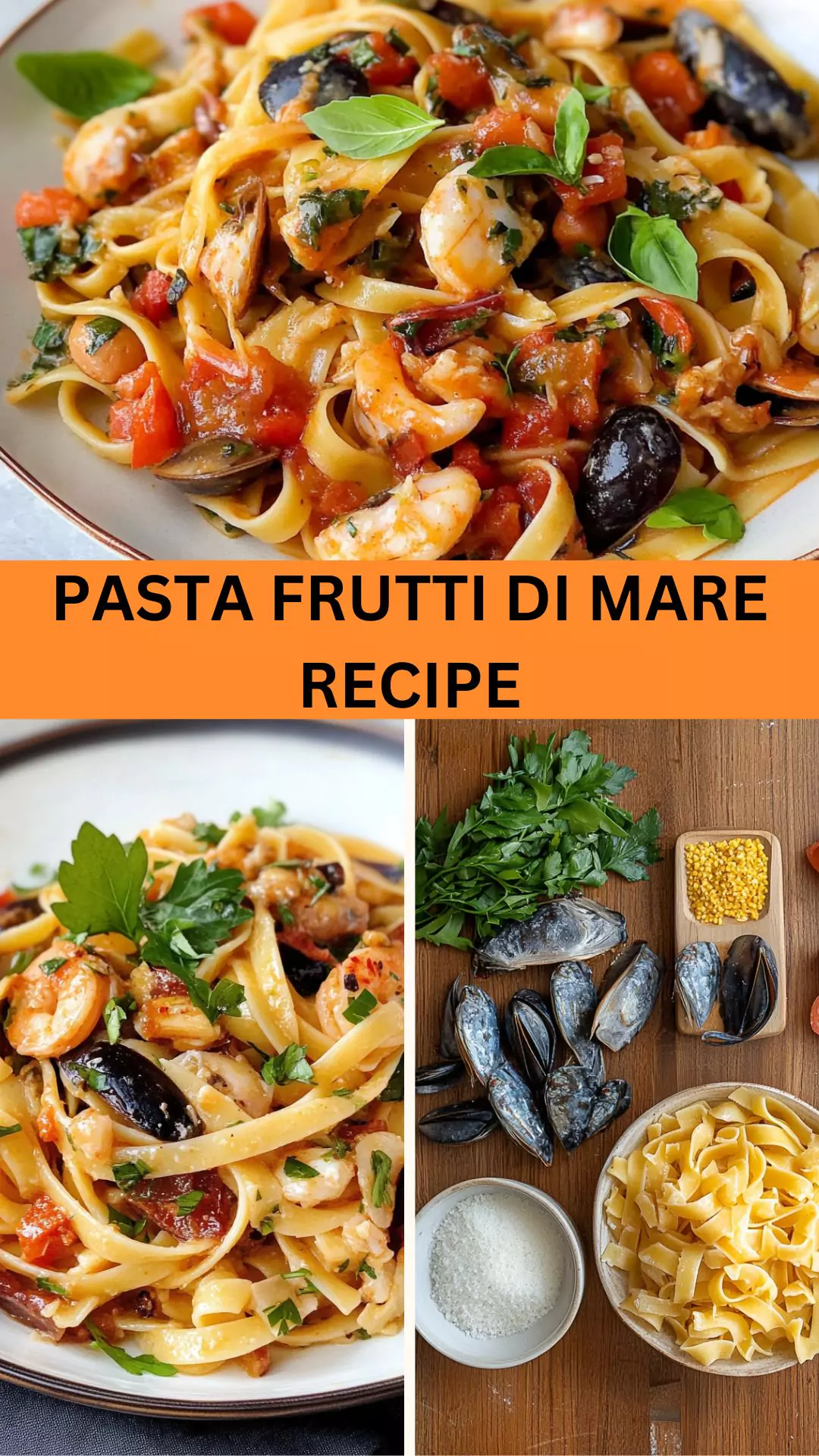Ah, pasta frutti di mare! The delightful union of pasta and seafood has a way of whisking you straight to the Italian coast with every bite. It’s a dish that speaks of summer, sunshine, and ocean breezes.
Whenever I find myself craving the sea without a plane ticket, I turn to this classic. But what pairs perfectly with this dish?
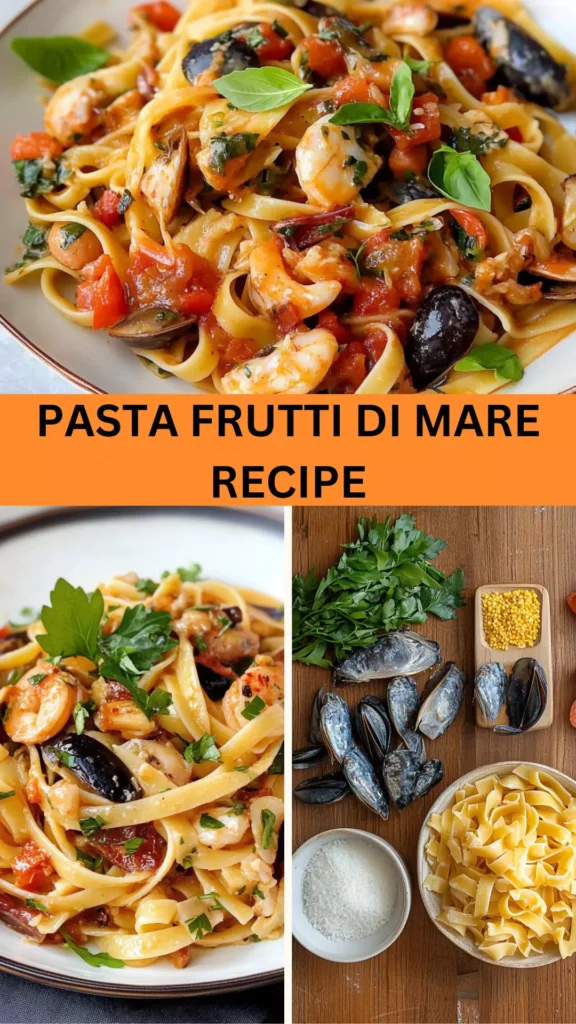
A crisp, chilled white wine or a vibrant salad might just do the trick. Picture this: a plate of cold, fresh arugula, tossed with a light vinaigrette to cleanse your palate before the main act. Sounds refreshing, right?
You will also like the following Dinner recipes!
- Best Jollibee Fiesta Noodles Recipe
- How to make Jollibee Hamburger
- Easy Jollibee Honey Beef Rice Recipe
What is Pasta Frutti di Mare?
Pasta frutti di mare literally translates to “pasta of the fruits of the sea.” This beloved dish showcases the bounty of the ocean, combining various seafood like shrimp, clams, mussels, and sometimes squid, all resting atop a glorious bed of pasta.
Every region in Italy has its twist, but the flavor generally remains consistent—bold and briny with a touch of garlic and olive oil.
The Ingredients
The beauty of pasta frutti di mare lies not only in its taste but also in its simplicity. It doesn’t require a long list of ingredients, which makes it even more approachable. Here’s what you’ll need:
- ¾ lb spaghetti
- 1 lb wild-caught shrimp, peeled
- ½ lb squid tentacles
- 1 lb mixed clams and mussels, thoroughly cleaned
- ¼ cup extra virgin olive oil
- 4 cloves garlic, grated
- 1 teaspoon red pepper flakes (plus extra for stamping your heat preference)
- ½ cup dry white wine
- 1 batch homemade arrabbiata tomato sauce (prepared in advance)
- 1 tablespoon fresh oregano (optional, for that extra herbal kick)
- 1 tablespoon capers (for a zesty briny flavor)
- ⅓ cup fresh basil leaves (or chopped Italian parsley)
- 1 lemon, for serving
- Sea salt, to taste
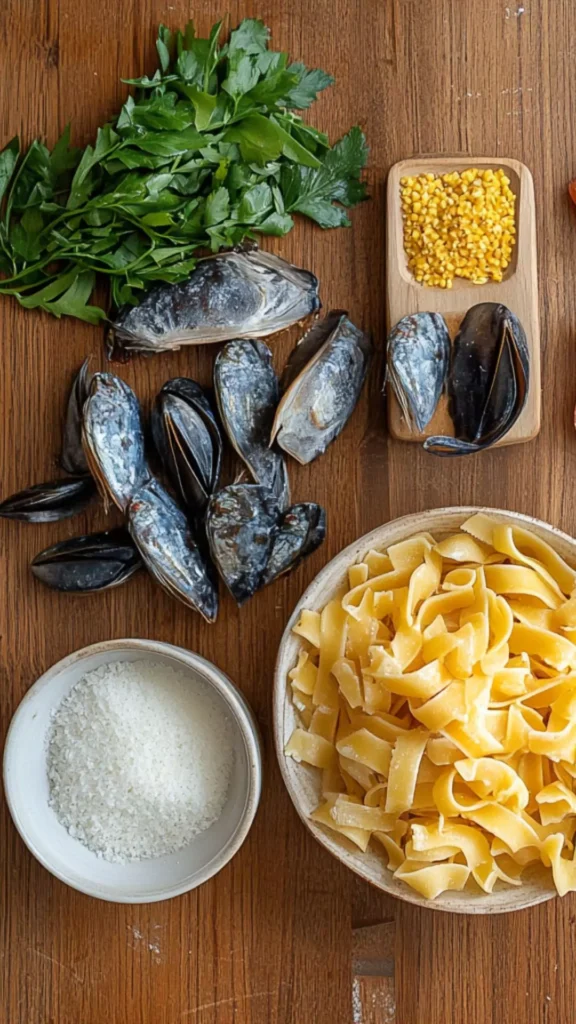
How to Make Pasta Frutti di Mare?
Alright, let’s roll up those sleeves and get cooking! The preparation of pasta frutti di mare is a joyous experience, merging the various elements harmoniously. But dammit, the execution is where the magic happens!
Step 1: Preparation
Before diving into the cooking process, ensure everything is prepped. This means cleaning the seafood, peeling the shrimp, and chopping up any herbs. Trust me, having everything ready makes the cooking factor smooth and enjoyable. Less fuss, more fun!
Step 2: Boil the Pasta
Fill a large pot with water, adding a generous amount of sea salt. You want it as salty as the ocean! Once it reaches a rolling boil, toss in your spaghetti. Cook until al dente based on package instructions. Drain, but make sure to reserve a cup of pasta water for later.
Step 3: Sauté the Aromatics
In a large skillet, heat the extra virgin olive oil over medium heat. Add your garlic and let it cook until fragrant, about 30 seconds. Don’t let it brown! We want flavors, not burnt bits.
Step 4: Add the Seafood
Toss those shrimp and squid into the skillet. Sauté them for about two minutes until they start changing color. Then, throw in the clams and mussels. Pour in the white wine and cover the skillet. Let everything steam together for about five minutes or until the shells open up. If some don’t open, toss them. They weren’t meant to be eaten.
Step 5: Combine with Pasta
Now comes the fun part! Uncover the skillet and add in your cooked spaghetti along with the arrabbiata sauce. Don’t forget to incorporate some reserved pasta water if you need to loosen the sauce. Stir everything gently to mix. You want to ensure each strand of pasta receives its share of the delicious sauce and seafood.
Step 6: Finish with Freshness
Finally, stir in the fresh herbs—basil, oregano, and capers. A splash of lemon juice uplifts the entire dish. Taste and adjust seasoning with sea salt and more red pepper flakes if desired.
Step 7: Serve!
Plate generously and present with lemon wedges on the side. I guarantee your guests will admire the vibrant colors swirling around the plate—a true feast for the eyes and palate!
Notes
Before you start, check out these tips for a flawless pasta frutti di mare experience:
- Use Wild-Caught Seafood: This makes a substantial difference in flavor and quality.
- Don’t Overcook the Seafood: Overcooked shrimp and squid can turn rubbery. Cook them until just opaque and tender.
- Make it Ahead: You can prepare the sauce in advance. Allow the flavors to deepen overnight in the fridge.
- Add Extra Lemon Zest: For a zesty finish, sprinkle some lemon zest just before serving.
- Experiment with Seafood: Don’t hesitate to substitute based on availability.
Storage Tips
If you have leftovers (not likely, but just in case!), store your pasta frutti di mare in an airtight container in the fridge.
Enjoy it within two days for the best taste. Reheat gently on the stovetop to avoid overcooking the seafood.
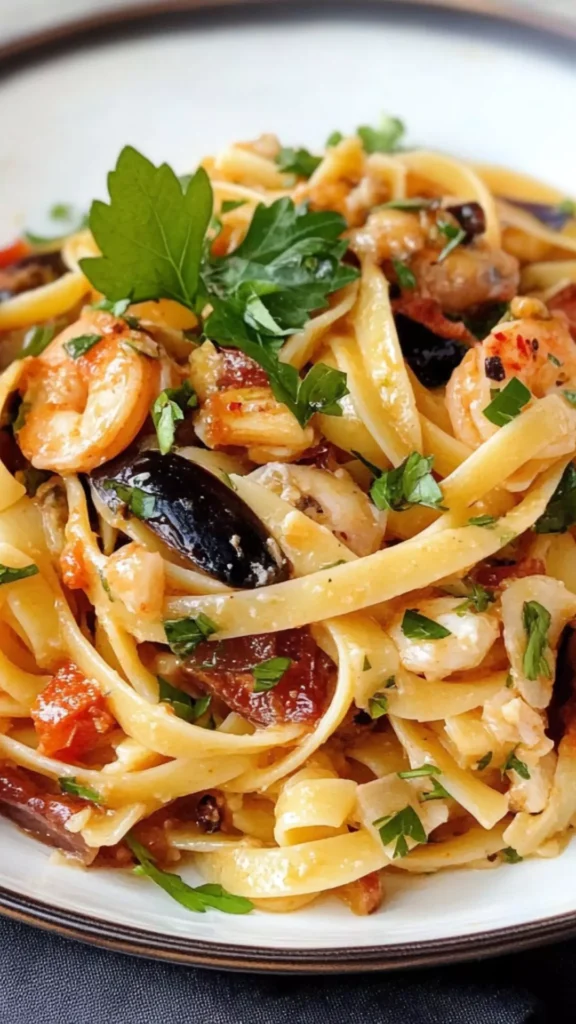
Serving Suggestions
Here are some great ways to accompany your pasta frutti di mare:
- Garlic Bread: Crunchy, buttery, and perfect for scooping up leftover sauce.
- Caesar Salad: Crisp romaine with tangy dressing balances the dish’s richness.
- Chilled White Wine: A glass of Pinot Grigio complements the flavors beautifully.
- Grilled Vegetables: Zucchini and bell peppers tossed with olive oil adds a smoky touch.
- Crusty Italian Bread: A simple but delightful side, perfect for sopping up that delicious sauce.
What Other Substitutes Can I Use in Pasta Frutti di Mare?
Adventuring in the kitchen can lead to some delicious surprises! Here are some substitutes:
- Sea Bass or Cod: If shellfish isn’t your thing, these white fish fillets work wonderfully.
- Linguine or Fettuccine: Swap out spaghetti for different pasta shapes if you prefer.
- Canned Anchovies: An excellent addition for an umami punch; just adjust the salt.
- Frozen Seafood Mix: Grab a bag from the store if you’re short on fresh seafood. Just make sure to adjust cooking times.
- Vegetable Broth: Instead of white wine, you can simmer your seafood in vegetable broth for a different flavor profile.
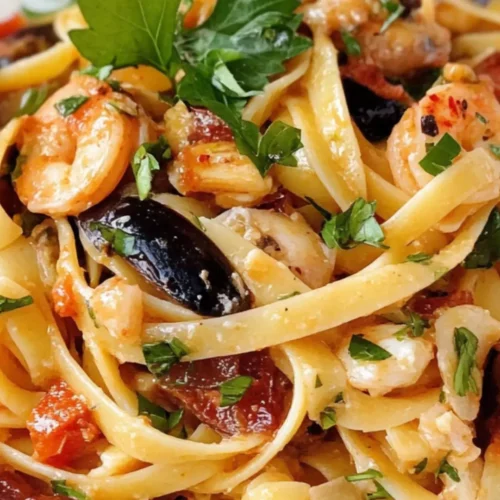
Pasta Frutti Di Mare Recipe
Equipment
- Large skillet and pot
Ingredients
- ¾ lb spaghetti
- 1 lb wild-caught shrimp peeled
- ½ lb squid tentacles
- 1 lb mixed clams and mussels thoroughly cleaned
- ¼ cup extra virgin olive oil
- 4 cloves garlic grated
- 1 teaspoon red pepper flakes plus extra for desired heat
- ½ cup dry white wine
- 1 batch homemade arrabbiata tomato sauce prepared in advance
- 1 tablespoon fresh oregano optional, for added herbal flavor
- 1 tablespoon capers optional, for a briny kick
- ⅓ cup fresh basil leaves or chopped Italian parsley
- 1 lemon for serving
- Sea salt to taste
Instructions
- Alright, let’s roll up those sleeves and get cooking! The preparation of pasta frutti di mare is a joyous experience, merging the various elements harmoniously. But dammit, the execution is where the magic happens!
Step 1: Preparation
- Before diving into the cooking process, ensure everything is prepped. This means cleaning the seafood, peeling the shrimp, and chopping up any herbs. Trust me, having everything ready makes the cooking factor smooth and enjoyable. Less fuss, more fun!
Step 2: Boil the Pasta
- Fill a large pot with water, adding a generous amount of sea salt. You want it as salty as the ocean! Once it reaches a rolling boil, toss in your spaghetti. Cook until al dente based on package instructions. Drain, but make sure to reserve a cup of pasta water for later.
Step 3: Sauté the Aromatics
- In a large skillet, heat the extra virgin olive oil over medium heat. Add your garlic and let it cook until fragrant, about 30 seconds. Don’t let it brown! We want flavors, not burnt bits.
Step 4: Add the Seafood
- Toss those shrimp and squid into the skillet. Sauté them for about two minutes until they start changing color. Then, throw in the clams and mussels. Pour in the white wine and cover the skillet. Let everything steam together for about five minutes or until the shells open up. If some don’t open, toss them. They weren’t meant to be eaten.
Step 5: Combine with Pasta
- Now comes the fun part! Uncover the skillet and add in your cooked spaghetti along with the arrabbiata sauce. Don’t forget to incorporate some reserved pasta water if you need to loosen the sauce. Stir everything gently to mix. You want to ensure each strand of pasta receives its share of the delicious sauce and seafood.
Step 6: Finish with Freshness
- Finally, stir in the fresh herbs—basil, oregano, and capers. A splash of lemon juice uplifts the entire dish. Taste and adjust seasoning with sea salt and more red pepper flakes if desired.
Step 7: Serve!
- Plate generously and present with lemon wedges on the side. I guarantee your guests will admire the vibrant colors swirling around the plate—a true feast for the eyes and palate!
Notes
- Use Wild-Caught Seafood: This makes a substantial difference in flavor and quality.
- Don’t Overcook the Seafood: Overcooked shrimp and squid can turn rubbery. Cook them until just opaque and tender.
- Make it Ahead: You can prepare the sauce in advance. Allow the flavors to deepen overnight in the fridge.
- Add Extra Lemon Zest: For a zesty finish, sprinkle some lemon zest just before serving.
- Experiment with Seafood: Don’t hesitate to substitute based on availability.
Nutrition
Frequently Asked Questions
1. Can I make pasta frutti di mare with frozen seafood?
Absolutely! Just make sure to thaw and pat your seafood dry before cooking. This ensures the best results.
2. How can I make this dish spicy?
To crank up the heat, add more red pepper flakes during cooking or include some diced fresh chili peppers.
3. Is pasta frutti di mare gluten-free?
Yes, it can be! Just use gluten-free pasta and ensure all other ingredients are free of gluten.
4. Can I add other seafood?
Without a doubt! Feel free to use scallops, crab meat, or even octopus for an exciting twist.
5. Is it safe to eat leftover seafood pasta?
Yes, but ensure it’s stored properly in an airtight container in the fridge and eaten within two days.
Conclusion
Pasta frutti di mare is a timeless classic that never fails to please. It showcases how simple ingredients can create something extraordinary. Whether you’re entertaining friends, cooking for your family, or indulging in a personal feast, this dish is sure to deliver on every level.
So go on, embrace those rich flavors, and let this Italian culinary jewel transport you to the sun-soaked shores of the Mediterranean with each bite. Don’t forget that chilled wine! Cheers to a delicious journey!

